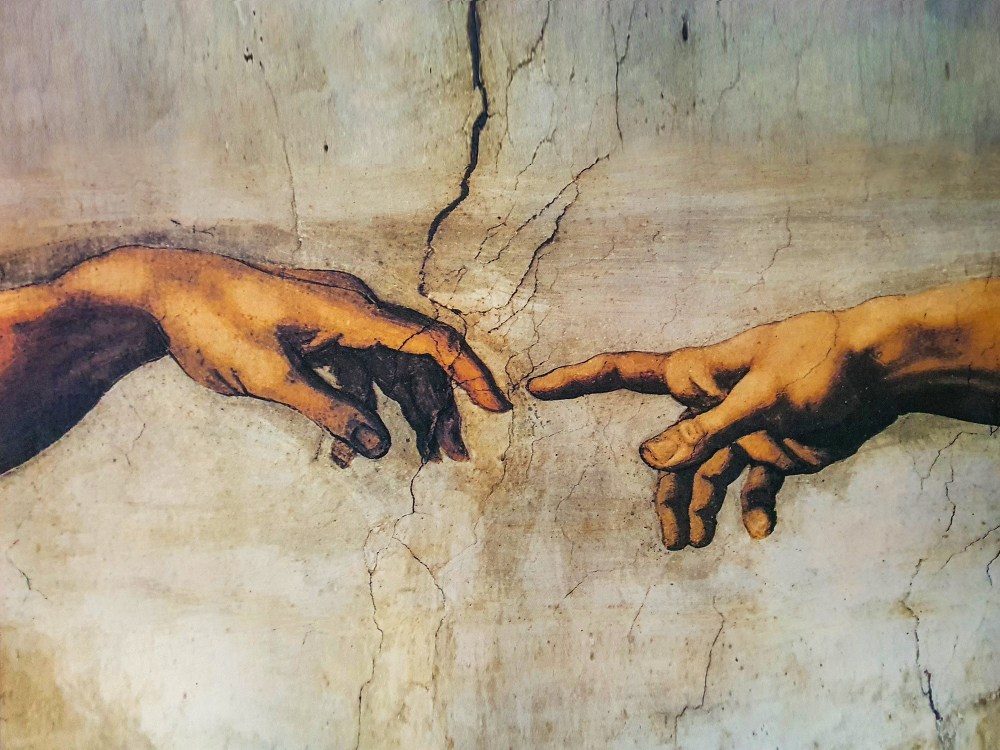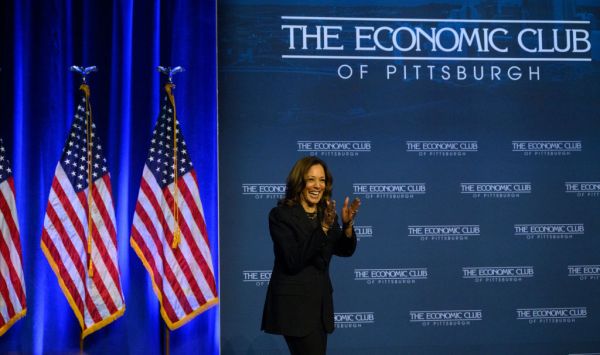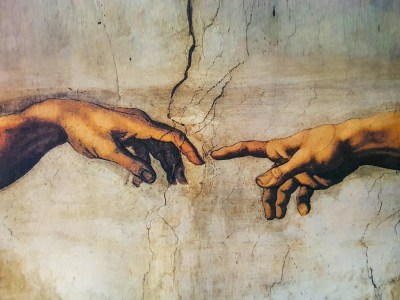Dear Reader (especially those of you embarking on the arachnid Hajj),
Author’s Note: This is a long G-File. I wrote it primarily for me. It’s got nothing to do with politics, and the jokes are few and far between. Just giving you a heads-up if you want to skip it, or skip to the canine update.
“‘Religiously informed culture,’” Kevin Williamson recently wrote, “is another way of writing ‘culture.’”
Kevin was responding to my recent conversation with Sam Harris for The Remnant (which caused him to yell at me in absentia). While his response did nothing to dispel allegations that there’s a certain dyspeptic streak in Kevin’s nonetheless invariably pellucid prose, I could not agree with Kevin more about this insight.
While I don’t think there’s a culture anywhere that hasn’t been profoundly shaped by religion, let’s stick with the West.
Even the supposedly religion-free zones of modern life—science, law, Harvard faculty meetings, etc.—would not exist but for the Judeo-Christian foundation they stand upon. If a religion-free society is a garden, you can pluck virtually any flower from the soil and find long religious roots dangling below. (Indeed, to strain the metaphor further, some of the plants in the garden are more like potatoes or turnips than flowers in that they’re nearly all religious root, with the bits breathing secular air little more than a hint of what lurks below.) Human rights, universal equality, the sovereignty of the individual, higher education, and scientific inquiry—even the idea of secularism itself—are products or byproducts of Jewish and Christian thought.
For instance, Western science flows straight out of the Abrahamic revolution. “Postulating a single creator for the entire universe,” writes Walter Russell Mead, “leads to the belief that the universe is predictable and rule driven.” Therefore, the universe outside of our heads is discoverable and knowable through investigation. The scientific method has many catalysts —from alchemy to dye-making to the necessities of war—but even these things had religious aspects, and the systemization of science itself was the product of religious scholastic orders and institutions (like Harvard used to be). Modern astronomy is largely a Christian invention. (Yes, the Chinese had astronomers, too. But when they discovered that the Christians were better, they imported Jesuits to jobs the Chinese couldn’t do.)
Or take the ideal of “universal brotherhood”—i.e. Equality. It’s a Christian idea flowing straight out of Paul’s exhortation to believers in Christ: “You are all sons of God.” And Paul, a heretical Jew, owed much of his thinking to his religious upbringing. You could argue that the idea of the right to follow your conscience started with Socrates—though given how things ended for him, that’s debatable. But the idea of conscience—conscientious objection to war, civil disobedience, etc.—became a thing thanks to folks like Aquinas and Martin Luther.
I suppose it’s possible that there could have been an alternative timeline where we got driverless cars and microwave ovens, democracy and the Bill of Rights, without Abraham and his theological progeny. But the indisputable fact is that we didn’t. And remember, God gave us plenty of time to figure this stuff out without Him. Our best guess is that Homo sapiens first appeared around 300,000 years ago. For about 285,000 years, humans had free rein to come up with a religion-free, rational, system of organization. Never happened. That’s in part because religion—or religiosity—is a human universal. One explanation for this is that religion is an evolutionary advantage, encouraging cooperation and self-sacrifice for the good of the group (or gene pool). There are other explanations. But, again, the important point is the past happened the way it happened.
Just as the life you’ve already lived—so far—can’t be changed, so too with all the lives that came before us. The past only happened once. There are no do-overs. Sure, you can rewrite the past, but the rewrites don’t change the reality. The culture we have is a culture created by religion and, occasionally, by opposition to religion (but even that opposition gives religion a major role in the process, like an activating agent or the sand that prompts the oyster to make a pearl). And that goes for atheism and science as much as it does for literature and music. The rights you enjoy today were put on paper by a bunch of men who believed those rights stemmed from the fact that we got them from a “creator.” That may bother you, but the facts don’t care.
Now, I could go on, but I think it’s more important to note that none of this “disproves” atheism or proves the existence of God or the divine truth of Christianity or Judaism. It’s not only possible to enjoy the fruits of religion without subscribing to, appreciating, or even being aware of the religious motivations of those who cultivated those fruits, it’s literally the unfolding story of the last few centuries. You don’t have to believe that your rights are God-given, but the belief that your rights are a gift from God is why we eventually got rights. The Protestant work ethic is often credited with the invention of capitalism (I think the case is often overstated), but you can be a full-throated capitalist without being a Protestant, never mind a Puritan. Socialism was a Christian invention—or at the very least the first versions of socialism were invented by Christians for Christian ends—but we’ve learned the hard way that you can be a socialist without believing in God or caring about Jesus’ teachings (or without actually caring about human equality). Similarly, you can use electricity without agreeing with Michael Faraday about Sandemanianism.
The two visions.
There are two kinds of people in the world: People who are slaves to false binaries and everyone else.
But I really do think there are two types of visions worth exploring. I’ll call them the utopian and tragic, but both words have real, and deeply ironic, drawbacks (and yes, Thomas Sowell’s unconstrained versus constrained vision is very similar). The utopian vision looks at the perfect ideal, the ultimate destination of humanity, holds it up against the past, and finds the past a bitter disappointment. To some extent, that’s fine. A lot of the past was really, really awful. Disease, war, torture, misery, brutality, ignorance, and poverty have been the norm of human existence far longer than they’ve been the exception. Where the utopians go wrong is thinking that the eminently flawed institutions of the past were the problem, rather than efforts toward the solution. They start with a vision of the perfect, then fault human institutions and systems for falling short of the ideal.
The tragedian starts from the premise that the natural state of man is awful and looks to find the aspects of institutions and systems that incrementally improved the human condition. Rousseau believed “man is born free and is everywhere in chains.” Edmund Burke was less pithy, but more accurate:
Man is not only ruled by evil passions; but his rational capacity is severely limited as well. Without the warm cloak of custom, tradition, experience, history, religion, and social hierarchy—all of which radical man would rip off—man is shivering and naked. Free man from all mystery, demystify his institutions and his intellectual world, and you leave him alone in a universe of insignificance, incapacity, and inadequacy.
But if you want something pithier, he also said: “Politics ought to be adjusted not to human reasonings but to human nature, of which reason is but a part and by no means the greatest part.”
For our purposes, the tragic vision is premised on the fact that human nature is flawed. But also that human nature has no history. What I mean by that is that while societies change, the building blocks of society—human beings—stay constant. We can get better—or worse—at making cathedrals and skyscrapers, but the bricks never stop being bricks. If all of our memories were wiped clean tomorrow, we would revert back to the same factory (or creator) installed software we were born with. It would be a long and bloody time before we held another election, filmed another movie, or played another game of football.
Progress is real, yet it’s not stored in our genes or souls—but in institutions and traditions. People understand tradition but sometimes struggle with the full meaning of institutions. When we hear “institution,” we think of things like foundations, universities, courts, or corporations. But fundamentally the economists have it right: Institutions are rules. The free market is an institution, by which I mean it is a system of rules and tradition as much as anything binds us to that system. The same goes for democracy, religion, and science. There are buildings full of people who help uphold those rules, but the rules are prior to the buildings and people. The Marines are an institution, but what makes the Marines different than the police or the Shriners are the rules, formal and informal, that Marines follow. The Catholic Church is a bunch of buildings, priests, nuns, and adherents. But what makes them the Church are the rules and customs that define Catholicism.
The tragic vision is a flawed term because it sounds dour and pessimistic. But it’s really a vision of gratitude. It recognizes that but for these institutions, these rules, we’d be the savage and poor creatures we were before they existed. The utopians see tradition as a hindrance to reason. The tragedians use reason to appreciate the value of tradition starting with the fact that reason itself is a tradition.
This is a point frequently made by critics of reason. And there are plenty of such people. Nietzsche, Heidegger, Hume, Freud, Foucault, all of the Romantics and Frankfurt School Marxists, and even my beloved Burke had their bones to pick with reason or over-reliance on rationality. We’re not going to go down all of those rabbit holes. But suffice it to say to the extent they can all be boiled down to saying “man does not live by bread alone,” they’re all correct. Beyond that it’s rabbit holes far as far as the eye can see.
Leaps all the way up.
But we might pause on Immanuel Kant and Søren Kierkegaard. The former offered the most famous critique of pure reason in his aptly titled Critique of Pure Reason, but Søren was no slouch. Neither rejected reason outright. Like Burke, they simply didn’t believe that reason was the only tool we needed. Reason is not a source of values, but a somewhat useful means of judging their worth and convincing people to do the right thing. Reason is indispensable, but not sufficient, to forming good conscience. But on the important things we must, as Kierkegaard, argued, make leaps of faith (though he never actually used the term). The existence of God is one such very important thing, but not the only one. What is the argument for ideals of universal human brotherhood, rights, and dignity?
Getting back to my recent conversation, Sam Harris would have us believe that these can be discovered through reason and the tools of science alone. I have no quarrel that one can offer an argument based solely on rationality for such things. But we know that others have used science and reason to argue against such things. In his newsletter, Kevin brought up eugenics, which is a great example. But there are others. Lenin thought it reasonable to liquidate the kulaks, and on his terms it was. Mao starved and killed millions out of an abundance of utilitarianism.
Many atheists object to such examples, arguing that their vision recognizes the innate worth of all humans as a fundamental tenet. But does “science” really provide evidence for that? Ultimately, it depends on how you define “worth.” Science can give you a long list of different definitions, but it can’t settle the question. All people aren’t equally intelligent, healthy, strong, attractive, etc. You can say these things don’t count, but why? Science can’t tell you; it can only measure the things it can measure, and maybe provide you with some cost-benefit analysis about the trade-offs. I can make a reasoned argument that society should devote its resources disproportionately to educating the smartest children, because one genius is likely to create something awesome that benefits humanity more in the aggregate than a million morons. “Abandon the natural-born ditch-diggers, and cultivate the Einsteins!” But, I don’t want to live in such a society for reasons no scientist can talk me out of.
Things get even more muddled with notions like rights and equality. Is a person who is mentally and physically disabled “equal” to a healthy one? Is a thieving drug addict as worthy as a hard-working doctor? Beyond saying “they’re all humans,” scientists don’t have much to offer. They have a lot to say about ethics, mostly about scientific ethics, but not much to add on morals. These questions require a leap of faith—perhaps not toward belief in God—but certainly a leap toward what is good and away from what is evil.
For instance, we’re all told that it is better that 10 guilty men go free than one innocent man be jailed or killed. I generally agree with the principle, but I can make a utilitarian case that this is wrong. Releasing 10 murderers will likely hurt society more than jailing one innocent man. Murderers murder people. Innocent men in jail don’t. The reason this principle is valuable, though, is that it instructs people—particularly people in power—not to willingly do evil, or cut corners for the greater or personal good. This principle is a leap of faith, not a mathematical proposition.
This is why I dislike so much philosophical utilitarianism. Utilitarians begin with leaps of faith about the good—without admitting their feet ever left the ground. Why is maximizing happiness for the most people good? Why is such a definition of “good” superior to others? From whence does it come other than mathematical syllogisms, tautologies, and begged questions?
Transcend to what? From what?
But let’s get back to religion. For Harris and many, many others, the Catholic Church was a lead weight on human progress, an albatross slowing our climb to a more perfect human union. I think the Catholic Church was more like a sail, pulling the ship of humanity toward something better. Was it flawed? Yes. Does it have a monopoly on truth, transcendent or otherwise? Not in my book (literally and figuratively). But I’m hard pressed to think of an institution that did more for the progress of humanity than the Church, despite the long list of indictments one can draw against various popes, priests, and Catholic potentates. Could there have been a better institution than the one history produced? Sure, I guess. But it didn’t happen, so why get all worked up about the superior institution that never existed? And given where the Church comes down on various issues today, making arguments based on what it said or did in the past is not all that powerful. It’s a human institution dedicated to divine principles. Are your arguments against the principles or the people searching for them? Hypocrisy is a legitimate complaint about human failings, but not a very powerful one about the ideals they fall short of. Ideals are, exactly that, ideals. We all fall short of them from time to time.
Harris believes, sincerely, that we have better ways to achieve “transcendence”—things like meditation, chemical inducements, etc. Hey, whatever it takes man. I don’t scoff at it. But transcend means to move beyond, to climb out or over to something else. So then the question becomes: transcend to what? From where? If this is all there is, there’s no there there to transcend to. It’s just more of the same. If we’re all just meat and neurons, transcendence is entertainment. Harris argues that we should create secular forms of ritual to capture the affections and attachments our evolved religious instincts desire. We don’t need God to make funerals and weddings meaningful, he argues. Putting aside the fact that we’ve had secular funerals and civic weddings for centuries, he’s right.
But what’s the point of the rituals in the first place if there’s no notion of something beyond, something transcendent? Feed the dead to the dogs or the crops and be done with it. Rituals don’t need God to be irrational. Science can’t give us a more rational reason to respect and mourn the dead, it can only offer a rational description of why we do it. Genetics can explain—or rather, offer an explanation (why we feel love)—but it can’t explain love.
Utopians reap the benefit of better marketing. Everyone thinks they’re optimists. “Some people see things as they are and say, ‘Why?’ I dream things that never were and say, ‘Why not?’” and all that treacle. Meanwhile, the tragic vision just sounds dour and pessimistic.
But utopia literally means “no place” because it cannot exist (in this life). Eutopia means the good place. And good places can exist. The difference is that utopianism is top down, while eutopianism is bottom-up. The eutopian looks at the world as it is in front of his or her face and says, “I can make this better.” More importantly, he sees what is already good and says, “Let’s keep it this way.” The utopian, from his Olympian heights, sees it all as bad, because it is not perfect. The eutopian down on the ground says, “Hold on a second: We have a lot of these things for a reason, and sweeping away all of Chesterton’s fences based on abstract idea will raze both the good and the bad without any concern for the differences between the two.”
I think making the perfect the enemy of the good is the more pessimistic vision, because it has little gratitude for the work that went into achieving the “merely” good. The eutopian recognizes that the good things we have involved huge amounts of toil and sacrifice, trial and error. Which brings me to dogma, another point of disagreement between Sam Harris and me.
Utopians see dogma as a hindrance to perfection. They like to talk about Rawlsian original positions, where some intellectual conceives of a world from scratch and wants to reverse-engineer reality to fit, bulldozing any dogmas that stand in the way. I see dogma as pitons in the granite cliff that humanity has been climbing for millennia to get away from the muck and mire from whence we hail. We hammer these spikes into the rock and use them to get a little closer to the good, to a summit of ideals we will never fully reach.
That path is not straight, in no small part because it’s not always obvious which way to go. In such moments we rest on the foundations of dogma, we find respite in the hard-accumulated wisdom that tells us what has been proven to be good—rights, democracy, decency, the golden rule, honesty, etc. When in doubt, do what you know is right and good and take comfort that your leap of faith was made with integrity based on that which you know to be good. Do not make an evil leap in the moment on the gamble that you’ll land on some greater good at the other side of the ravine.
Obviously, there are bad dogmas. But it takes time and effort to discover them, and even more time and effort to get rid of them. Slavery was a universal institution for millennia. It took a lot of work and bloodshed to get rid of it (and the job isn’t finished). Science didn’t tell us slavery was bad, but experience and religion (eventually) did. And as a result, I am dogmatically opposed to slavery and dogmatically in favor of keeping that dogma in place. That is progress. And progress requires working from the ground up. Dogma did tell us that forced sterilizations and euthanasia were bad, but scientists have told us to leap over the dogma to the greater good.
I’ve gone way too long, and I wouldn’t blame you for not getting this far. This is just something I needed to get out of my head. But I think we live in a time of profound ingratitude for how good we have it. I do not put Sam Harris in this camp. I think he is a brilliant and decent man with whom I have meaningful disagreements about how to see the world, but powerful agreements about what is wrong with it today.
But everywhere I look, right or left, up and down, I see people who think the nation they’ve inherited is something to resent. The sense of entitlement—the very opposite of gratitude—derives from various forms of utopianism, including the personalized version of it we might call narcissism. After all, not all utopianisms are about creating a perfect world for everybody. Some people just want a perfect world for them or their tribe. Regardless, the utopians see all that is good as contemptible in the reflection of their personal idea of perfection. All the work that went into getting us here is taken for granted, and the prosperity and freedom we enjoy is proof that “the system” has failed them because it hasn’t provided them with enough, while it has provided others too much. Systemized envy is a metastasizing cancer in American life eating holes in our souls. Science cannot fill such voids, but religion can. And so can a little gratitude for the difficult slog and sacrifice made by others to get us here.
Various & Sundry
Canine Update: Everyone is doing just fine, though Zoë has acquired a kind of sad habit. A while back the Fair Jessica took a bone from the dingo and put it up on the mantel. It hasn’t been there for weeks, but almost every night Zoë stares at where she thinks it still is and looks at us to get it down for her. But other than that, she’s fine (and her dingo-spreading game is really coming along). Her energy is back up and she’s raring to go every morning. Pippa meanwhile, is moving more and more slowly in the mornings. She’s getting a little creaky and takes her time coming down the stairs, bunny hopping down. Once she gets going she moves fine. Just a sign that age is catching up with her, which makes me sad. And her nap skills are on point. They’re having a sleepover at Kirsten’s this weekend (they’re very excited and Zoë has reportedly already emptied out the toy basket at Kirsten’s looking for her stuff). They’ll be there again next week because we’re traveling, first to Virginia to see some border collie trials which I am really excited about, and then I’m heading to Utah for a talk. Gracie will have a team of cat sitters attending her, so she’ll be fine. About Chester: Who knows, that’s up to them. Though I suspect the appeasement will continue.
The Dispawtch

Owner’s Name: Cathryn Lopez
Why I’m a Dispatch Member: I value your truly unbiased commentary (though I am on team Nick and David rather than team Jonah and Steve when it comes to this election). I read all of your dispatches, but especially enjoy Boiling Frogs from Nick. The Remnant is often on my headphones at work. Most of all, The Dispatch has provided sanity in these turbulent and chaotic times.
Pet’s Name: Auggie
Pet’s Breed: English Springer Spaniel
Pet’s Age: 4 months
Gotcha Story: I lost my 14-year-old Springer in May and knew I needed a pup in my life again, quickly. Auggie came from a nearby home breeder and is a very good boy. He was house-trained within the first week. I look forward to the loss of the puppy teeth and watching him continue to grow.
Pet’s Likes: Chewing on shoes, chewing on rugs, chewing on pillows—chewing on just about anything! He loves swimming in the pool with his doggy buddies and cozying up in his crate with his pupsicle.
Pet’s Dislikes: Getting a bath, loud noises, and sleeping through the night.
Pet’s Proudest Moment: Mastering the art of jumping on the sofa unaided.
Moment Someone (Wrongly) Said Pet Was a Bad Dog: It hasn’t happened as he is, indeed, a very good dog.







Please note that we at The Dispatch hold ourselves, our work, and our commenters to a higher standard than other places on the internet. We welcome comments that foster genuine debate or discussion—including comments critical of us or our work—but responses that include ad hominem attacks on fellow Dispatch members or are intended to stoke fear and anger may be moderated.
With your membership, you only have the ability to comment on The Morning Dispatch articles. Consider upgrading to join the conversation everywhere.